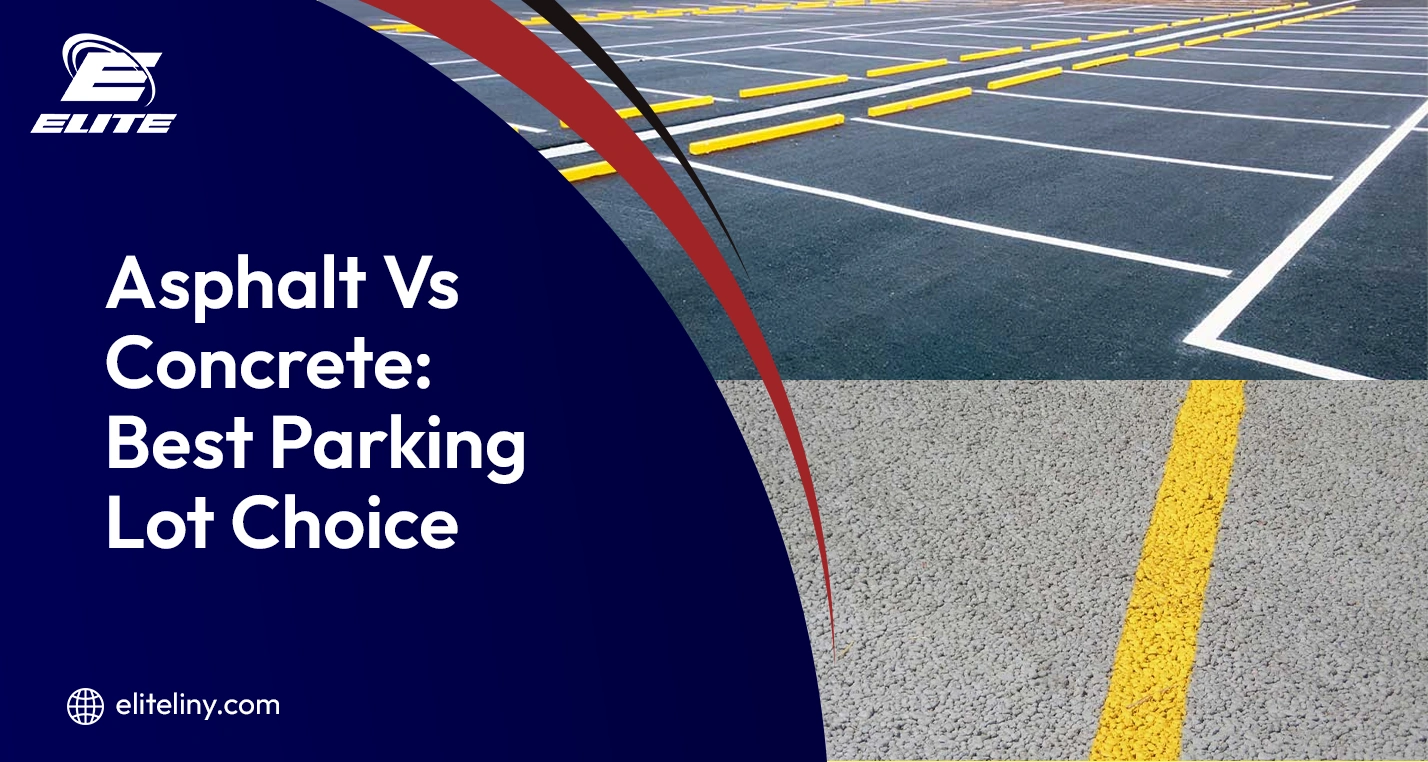One of the most important decisions when building or resurfacing a parking lot is choosing between asphalt and concrete. While both materials are durable and widely used, they differ in cost, installation speed, maintenance, climate performance, and lifespan. Asphalt is typically more affordable and quicker to install, making it popular for budget-conscious projects. Concrete lasts longer, requires less maintenance, and offers a more polished look, though it comes with a higher upfront cost.
So, which option is better for your property? The answer depends on your budget, local climate, and long-term goals. Let’s break down the features of each surface to help you determine the best parking lot between asphalt and concrete for your needs.
Clear Comparison: Asphalt vs Concrete Parking Lots
Here is a clear comparison table to understand the difference between asphalt and concrete parking lots:
| Feature | Asphalt | Concrete |
| Cost | Lower upfront cost, cost-effective for large areas | Higher upfront cost but lower long-term maintenance expenses |
| Installation Time | Quick to install, ready in 2–3 days | Longer curing time, usually 7–10 days |
| Durability | 15–20 years with maintenance | 30–40 years with minimal repairs |
| Maintenance | Requires regular sealing and repairs | Minimal maintenance, occasional sealing or joint filling |
| Appearance | Dark, uniform look; fades over time | Can be customized with colors, patterns, and finishes |
| Climate Effect | Performs well in colder climates; flexible in freeze-thaw cycles | Performs well in hot climates; may crack in freezing conditions |
| Eco-Friendliness | Recyclable material, reused in paving projects | Reflective surface reduces the heat island effect |
Features of Asphalt and Concrete Parking Lots
Before diving deeper, let’s look at the defining features of each material:
- Asphalt is flexible, quick to install, has a lower upfront cost, and is dark in color, but it requires more maintenance.
- Concrete is rigid and long-lasting, but it has a higher upfront cost. It is available in decorative finishes and is ideal for hot climates.
These features set the stage for understanding which option works best for your parking lot project.
When Should You Choose Asphalt for the Parking Lot?
Asphalt is often the go-to choice for property owners who want a quick, affordable, and functional solution. Here’s why asphalt may be the right pick:
- Lower Initial Cost: Asphalt is cheaper to install, making it attractive for budget-conscious projects or larger parking areas.
- Faster Installation: Asphalt can be laid and ready for use in a few days, minimizing business downtime.
- Flexibility: Its ability to expand and contract makes asphalt ideal for regions with freeze-thaw cycles.
- Ease of Repair: Cracks and potholes in asphalt can be repaired quickly and at a relatively low cost.
- Recyclability: Old asphalt is often reused, making it an environmentally sustainable choice.
Asphalt may be your best option if you’re operating in colder climates or need a fast turnaround.
When Should You Choose Concrete for the Parking Lot?
Concrete, while more expensive initially, stands out for its durability and aesthetics. Consider concrete if:
- Long-Term Investment: Concrete parking lots can last up to 40 years with proper care, making them a great choice for long-term cost savings.
- Minimal Maintenance: Unlike asphalt, concrete doesn’t require regular sealing, reducing ongoing expenses.
- Durability in Heat: Concrete performs exceptionally well in hot climates, where asphalt may soften or rut.
- Customization: Concrete can be stamped, colored, or textured to create decorative finishes that enhance property appeal.
- Load-Bearing Strength: It can withstand heavier vehicles, making it ideal for industrial or high-traffic parking lots.
If aesthetics, longevity, and low maintenance are priorities, concrete is often worth the higher upfront investment.
Additional Considerations Before Choosing
While the features of asphalt and concrete play a major role in decision-making, other factors should also be considered:
- Budget Over Time: Think about the total lifecycle cost. Asphalt may cost less upfront but requires frequent maintenance, whereas concrete costs more initially but saves on upkeep.
- Climate: Asphalt tends to perform better in colder climates with freeze-thaw cycles. In hot, sunny climates, concrete usually outlasts asphalt.
- Traffic Load: Concrete offers better load-bearing capacity for heavy truck traffic or industrial use.
- Aesthetic Goals: Concrete is more versatile if you want a decorative finish that improves curb appeal.
- Downtime Tolerance: Businesses that can’t afford extended closures may prefer asphalt for its quick installation.
- Long-Term Savings: Matching the material to climate and usage reduces costly repairs.
- Sustainability: Choosing recyclable or energy-efficient materials contributes to eco-friendly property management.
Conclusion
When weighing asphalt vs. concrete as the best parking lot choice, the decision largely depends on climate, budget, and long-term goals. Asphalt is quick, affordable, and flexible, perfect for colder regions and projects that require fast installation. Concrete, on the other hand, offers durability, minimal maintenance, and a polished appearance, making it ideal for hot climates and high-traffic areas.
By understanding each’s features, such as installation speed, maintenance needs, and lifespan, property owners can make a well-informed decision. Making the right choice ensures safety, longevity, and overall value for your parking lot investment. If you’re unsure which material is best for your property, connect with Elite Parking Area Maintenance for expert advice and professional installation services.

